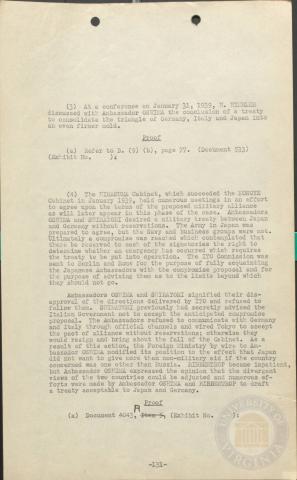
Page 131
| Parent | Collaboration Between Japan, Germany and Italy Volume III |
|---|---|
| Date | 23 February 1940 |
| Language | English |
| Collection | Tavenner Papers & IMTFE Official Records |
| Box | Box 15 |
| Folder | Japan, Germany, Italy Collaboration Vol 3 |
| Repository | University of Virginia Law Library |
(3) At a conference on January 31, 1939, H. HEZMLER discussed with Ambassador OSHIMA the conclusion of a treaty to consolidate the triangle of Germany, Italy and Japan into an even firmer mold.
Proof
(a) Refer to B. (9) (b), page 77• (Document 533) (Exhibit No. )s
(4) The HIRANUMA Cabinet, which succeeded the KONOYE Cabinet in January 1939, held numerous meetings in an effort to agree upon the terms of the proposed military alliance as will later appear in this phase of the case. Ambassadors OS Him and SHIRATORI desired a military treaty between Japan and Germany without reservations. The Army in Japan was prepared to agree, but the Navy and business groups were not. Ultimately a compromise was reached which contemplated that there be reserved to each of the signatories the right to determine whether an emergency has occurred which requires the treaty to be put into operation. The ITO Commission was sent to Berlin and Rome for the purpose of fully acquainting the Japanese Ambassadors with the compromise proposal and for the purpose of advising them as to the limits beyond which they should not go.
Ambassadors OSHIMA and SHIRATORI signified their dis¬approval of the directions delivered by ITO and refused to follow them. SHIRATORI previously had secretly advised the Italian Government not to accept the anticipated compromise proposal. The Ambassadors refused to communicate with Germany and Italy through official channels and wired Tokyo to accept the pact of alliance without reservations; otherwise they would resign and bring about the fall of the Cabinet. As a result of this action, the Foreign Ministry by wire to Am¬bassador OSHIMA modified its position to the effect that Japan did not want to give more than non-military aid if the country concerned was one other than Russia. RIBBENTROP became impatient, but Ambassador OSHIMA expressed the opinion that the divergent views of the two countries could be adjusted and numerous ef¬forts were made by Ambassador OSHIMA and RIBBENTROP to draft a treaty acceptable to Japan and Germany.
Proof
(a) Document 4043, A Item 5 (Exhibit No. ):
